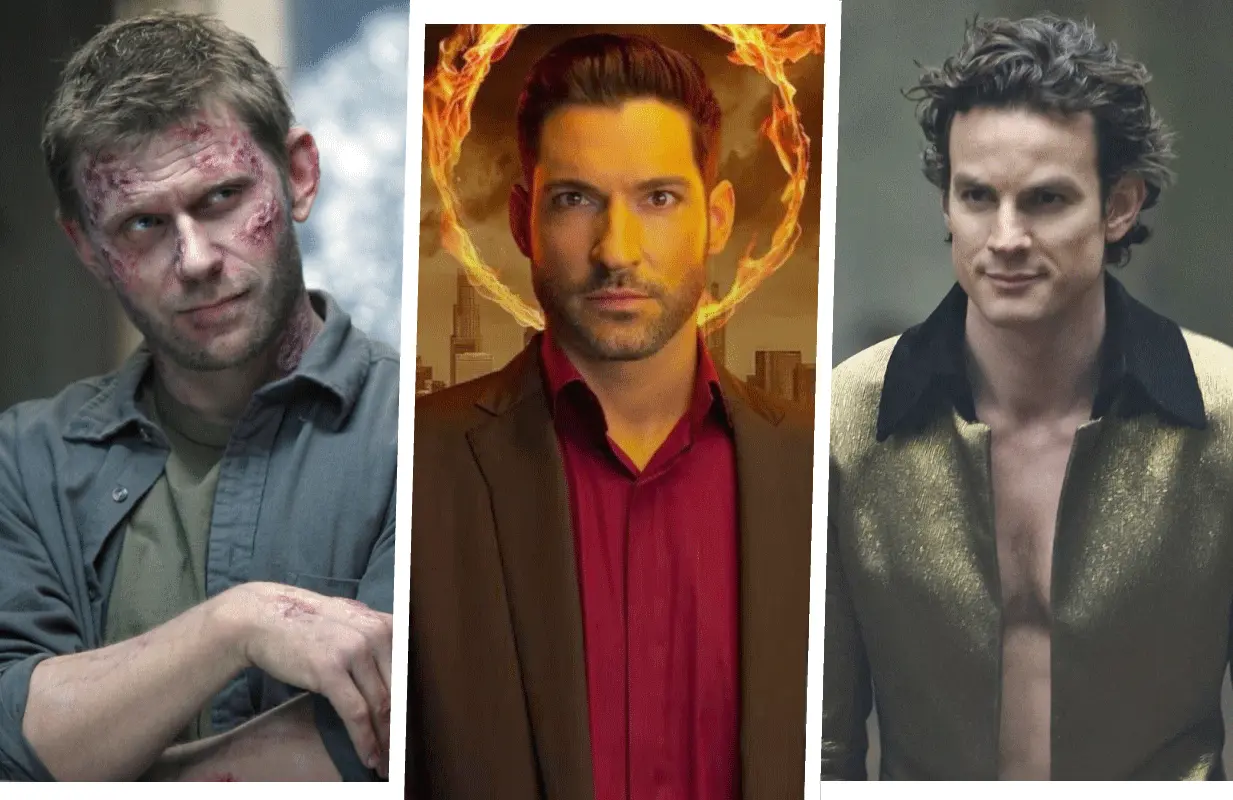The Devil(s) We Know: Six Ways TV Has Depicted Satan
-
 Photos: The CW, Netflix.
Photos: The CW, Netflix.In the new Netflix comedy God's Favorite Idiot, Ben Falcone plays an ordinary Joe who gets struck by lightning, attains a frequently glowy exterior, and also perhaps a higher celestial purpose. Falcone and real-life wife Melissa McCarthy play a couple once again, and they've got to deal with angels and prophecies and four quite literal horsemen (horsepeople, sorry!) of a seemingly literal Apocalypse.
Of course you can't have all that Biblical imagery without making space for the devil, so yes, Satan does in fact show up, as a leather-bodysuit-wearing, motorcycle-riding woman played by Leslie Bibb (Iron Man; Popular).

The tradition of depictions of the Prince of Darkness on television is one that goes back as far as the medium itself. That horn-tailed little devil has appeared in shows from The Twilight Zone to Northern Exposure to Star Trek, with almost as many guises and creative interpretations as one can imagine.
The devil has proven to be an incredibly malleable concept, able to be threatening, comedic, mundane, basically whatever the story requires of him. Bibb's take is sleek and intimidating, especially when contrasted with Falcone and McCarthy as a pair of regular tech-support schmoes, while casting Satan as a gorgeous woman leaves the door open for a lot of interesting character details.
With that in mind, we thought we'd delve into the history of the devil as portrayed on various TV shows. How did these distinct characterizations serve the shows that crafted them?
Fantasy Island: The Devil as Hammy Rival
The great actor Roddy McDowall appeared twice on Fantasy Island as Mephistopheles, longtime (very longtime) nemesis of Ricardo Montalban's Mr. Roarke. As Roarke was always alluded to being a quasi immortal presence on the island, it made sense that his rival would be an equally timeless villain.
In each of his appearances, Mephistopheles tried to claim the souls of some or Roarke's guests, only to be bested, though not before he showed his true face… and horns. McDowall was perfect casting for a devil who really needed to ham it up on screen to keep up with Montalban's equally larger-than-life persona, and he succeeded impishly.
Supernatural: The Devil as Emo Fallen Angel
It shouldn't surprise that over the course of its fifteen seasons, Supernatural made its fair share of deals with the devil. For a show that trafficked in demons on a weekly basis, the Prince of Lies was inevitable. So when he eventually showed up played by actor Mark Pellegrino (Jacob on Lost), the only question was how he'd be depicted.
In this case Lucifer ended up serving a few different purposes on the show, including occasional wary ally, but mostly as a fallen angel and black sheep of the family, constantly in battle with his brother Michael. Pellegrino's Lucifer was moody, emo, and sometimes even tragic. But he was also, you know, The Devil, so your sympathy couldn't really go very far.
Lucifer: The Devil as Hot L.A. F*ckboy
What if the Devil was a wildly hot nightclub owner in modern-day Los Angeles who's shirking his duties to preside over Hell so he can instead live it up among Earthly pleasures? Like Supernatural's devil, Lucifer Morningstar (Tom Ellis) of Lucifer is motivated by daddy issues and family drama, but that takes a back seat to the concept of the devil as hotcha-motcha, yowie-wowie hot, even as the show places him in a police procedural context, using his abilities to draw out people's worst desires (hey sure!) to help solve crimes.
Rick & Morty: The Devil as Stephen King Parody
Leave it to Rick & Morty to not give us a straightforward depiction of the Prince of Darkness. Instead, their devil is wrapped up in an intricate Stephen King parody, based on his novel Needful Things. In that film, the devil is an unassuming old man played by Max Von Sydow who owns a curio shop that's essentially a front for him to make Faustian bargains with various locals, ultimately sowing murder and mayhem in small-town New England.
Rick & Morty makes no bones about the target of its parody, as "Mr. Lucius Needful," who runs an evil curio shop where Summer goes to work. The show takes the premise from there, spinning it off to its own comedic ends, but as a hyper-specific cultural reference to an underrated King property, it's spot-on.
The Chilling Adventures of Sabrina: The Devil as (Unfortunately) Your Dad
So much of The Chilling Adventures of Sabrina concerned the interpersonal and dynastic concerns of the realms of Hell and the demonic, so it was inevitable that Lucifer (Luke Cook) would be a major presence, though maybe a little surprising that he turned out to be Sabrina's birth father, something that was further complicated when Sabrina created a second version of herself to rule over Hell as "Sabrina Morningstar." The show's depiction of thier relationship was always over-the-top creepy, which kind of detracted from the fact that this Lucifer was also incredibly hot.
Reaper: The Devil as Leland Palmer
There is perfect casting and then there is really perfect casting, like when your show is about two slackers who find themselves in the employ of Satan, harvesting souls of those who have escaped hell as kind of bounty hunters. Satan is portrayed as a charming, amiable Prince of Darkness, and in the role, the show cast Ray Wise, most famous for his performance as Leland Palmer in Twin Peaks. The more you know about that show and Leland's story in it, the more deliciously perfect this casting is. Even if the show was short-lived, Wise's performance was one to savor.
Joe Reid is the senior writer at Primetimer and co-host of the This Had Oscar Buzz podcast. His work has appeared in Decider, NPR, HuffPost, The Atlantic, Slate, Polygon, Vanity Fair, Vulture, The A.V. Club and more.
TOPICS: God’s Favorite Idiot, Chilling Adventures of Sabrina, Fantasy Island (1977 Series), Lucifer, Reaper, Rick and Morty, Supernatural, Luke Cook, Mark Pellegrino, Ray Wise, Roddy McDowall, Tom Ellis